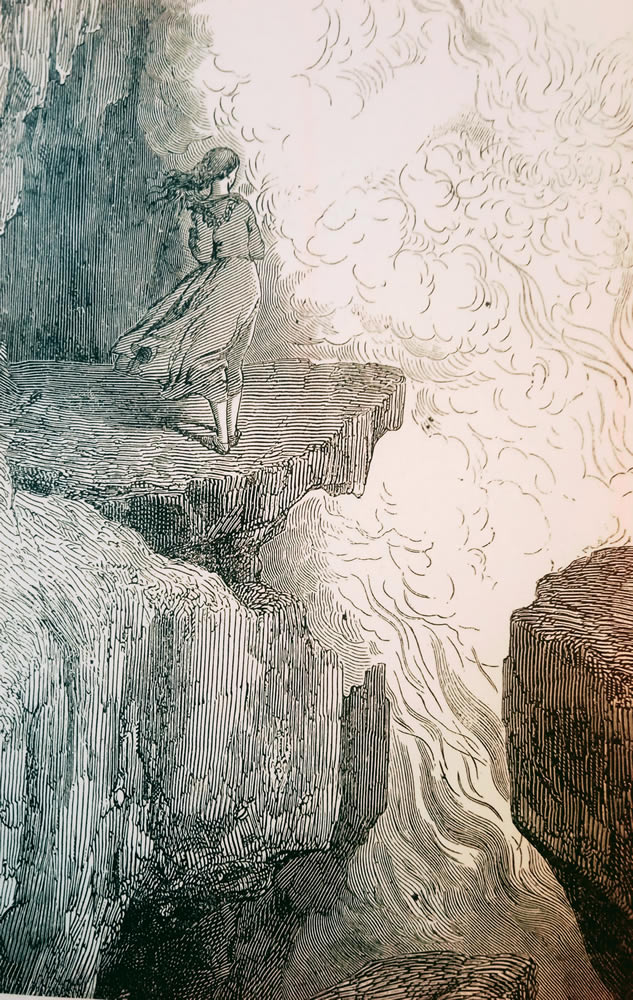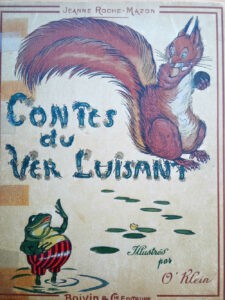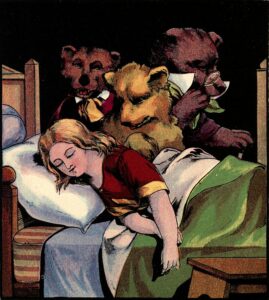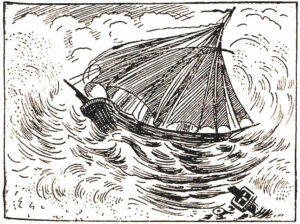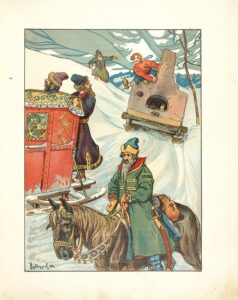
The man without tears
LIRE
The Man Without Tears
There was in a charming house, a few leagues from the little town of Homburg, a very rich man, who was called Count Baldrik.
He owned several houses in Frankfurt, castles in all the vicinity, and one could, it was said, walk a whole day without setting foot outside his domains.
He had a large number of servants, hunting equipments which he never used, and a table always admirably served, from which he often rose without having begun a single dish.
His cellar was said to contain the best wines of the Rhine, France and Hungary; these wines were served to him in silver and vermeil goblets; these goblets he often brought to his lips, but almost always he rested them on the table having barely touched them with the tip of his lips.
It was that he lacked one thing, to this man , for whom fortune seemed to have exhausted its treasures.
He couldn’t cry.
No joy or pain could bring a tear to his eye.
He had lost his father and could not cry, he had lost his mother and could not cry, he had lost two of his brothers and could not cry.
Finally, after ten years of barrenness, his wife had given him a daughter, the object of all his desires, and he had been unable to weep.
This girl was fourteen years old and named Lia.
One day she entered her father’s room and found him in the darkest corner of that room, sitting and sighing.
– What is the matter with you, father?” asked the child It seems to me that you are very sad.
– Very sad indeed, said the count; for I have just lost the last of my brothers: your uncle Karl is dead.
Lia was very fond of her Uncle Karl, who always sent her lovely gifts at Christmas. So when she heard the news from her father, tears welled up in her eyes.
– Oh my poor uncle!” she cried, sobbing.
– Blessed child, who can cry!” murmured the earl, looking at his daughter with an envious eye
– But, since you have so much sorrow, you, why don’t you cry?” she asked her father.
– Alas!” replied the father, “tears are a gift from heaven which the Lord has denied me; infinite mercy is with him who weeps, for he who can weep weeps his sorrow along with his tears, while, I, must have my heart broken.
– But why is that?
– Because God has denied me what he grants to the last of creatures: tears.
– If God has denied them to you, father, God can grant them to you, and I will pray to him so much and so hard, that he will give them back to you. But the comie shook his head.
– My fate is fixed, he said, and I must die for want of being able to cry. When my heart is full of the tears my eyes should have shed, it will break, and all will be said.
Lia knelt before her father, and, taking both of his hands:
– Oh no, no, father, she said, you will not die; there must be some way to restore to you the tears you have lost; tell me what that way is and the rest will be up to me.
The count hesitated for a moment as if, indeed, there was a way; but doubtless that way presented too great difficulties for a child of the girl’s age; for, without answering, he rose and went out.
Lia did not see her father again that evening. The next day at lunch, she waited for him again uselessly. He did not come downstairs.
But he told her to come up to his house when she had lunch herself.
She immediately got up from the table and went up to her father’s room.
He was, as he had been the day before, half sitting, half lying in his chair and his face was as pale as if he had already died.
– Dear child, he said to her, my heart is already so full and heavy, that it seems to me near to bursting: I feel the tears rising and roaring within me like a torrent near to break its dam, and, as it seems to me that I am going to die, I have called you so that you may know well that I bear the penalty of a crime which was not committed by me.
– Oh speak, speak, father!” cried the child; perhaps by telling your woes, tears will come to you.
The earl shook his head like a man in despair, but he went on nonetheless.
– So I will tell you, my dear child,” he said, “how it is that God has denied me tears.”
My grandfather was a hard man, who had reached the age of fifty without having pitied a single unfortunate person. He was of robust health, and very rich, so that, having never known either sickness or misery, he said that sickness was an effect of the imagination and misery the result of disorder. Or, if he was forced to admit that the disease really existed, he would say that the patient had brought it upon himself by his irregular life or by a bad diet. So that neither poor nor sick, finding pity near him, found help there either.
There was more: the mere appearance of unhappy people was unbearable to him, and the sight of tears gave him fury during which, having completely lost his reason, he was capable of anything.
One day, a wolf was reported in the vicinity of the castle that was doing enormous damage. It had strangled sheep and horses, and had even often attacked men; so that, much more in order not to hear any more the complaints and not to see any more the tears of the victims of the terrible animal than by a feeling of philanthropy,my grandfather resolved to purge the region of the monster which desolated it.
He set out with several hunters from the neighborhood. In the night the wolf had been diverted by a very skillful spiker; so that they went straight to his fort, and the animal took to hunting.
At the end of an hour’s furious chase, the wolf, pressed by the dogs, instead of making a great party,-as is the habit of these animals, took refuge in the hut of a coalman.
Unfortunately, the coalman’s child, who was three or four years old, was playing on the door.” The wolf, enraged, threw himself on the child and strangled him.
The mother, who was inside the hut, saw what was happening; but, before she could rescue her child, the poor little one was already dead.
She gave a loud cry. The father, who was felling a tree twenty paces away, ran over with his axe, and split the head of the wolf. In the meantime, my grandfather, mounted on a horse dripping with sweat, as heated as his horse, arrived with his rough gaits.
He saw the dead wolf, the peasant his bloody axe in his hand, and the woman sobbing as she held her dead child in her arms.
– Why do you weep, woman, he cried to her, when the misfortune that befalls you is your own fault? If you had not let your child wander, the wolf would not have met him on his way, and would not have strangled him.
And you, he asked the man, how did you have the audacity to kill the wolf I was hunting?
– Ah lord, have mercy!” cried the coalman and his wife, both weeping loudly.
– By the devil’s horns! Are you soon done with all your whining?” said my grandfather.
And, as the woman showed him, still crying, the corpse of her child, believing that this sight would soften him, exasperated by this sight, on the contrary, he gave on the. head of the poor woman such a blow with the handle of his whip, that she fell backwards, rolling on one side, while the corpse of her child rolled on the other.
Then the coalman made a threatening movement; but, almost immediately throwing the axe away from him, and raising his unarmed arm to my grandfather;
– Ah, marble heart!” he said, “you cannot see the tears of a mother and father who weep for their child; well, in the name of the Lord, I say to you: there will come an hour for you when you will want to weep, when you will not be able to do so, when the tears locked up in you will break your heart. Go, and let this punishment of your hardness be upon you and upon your children to the third generation!
As unimpressed as he was, my grandfather was appalled at this curse, and, turning his back on that cursed hut, he rode away at full gallop.
He had four sons.
The eldest was a gambler, squandered the fortune he had accounted for, sailed to America, and was drowned in a shipwreck.
Hearing this news, my grandfather felt like crying, but he couldn’t.
His second son entered a political conspiracy; the conspiracy failed, and he had his head cut off as a traitor.
Seeing him walk to the scaffold, with his head held high, but already pale from his impending death, my grandfather would have liked to weep, but he could not.
His third son, who was his beloved son, was a great hunter like him. One day, as they were both running the boar, the young man’s horse swerved, and threw his rider against a tree where he broke his head.
My grandfather had seen the accident; he jumped down from his horse, but only arrived to receive his son’s last breath; my grandfather raised both hands to heaven; and, with a dreadful accent of despair:
– O my God!” he cried, “a tear, a tear!
But the curse was there, and, as he could not weep, his heart broke and he died.
Was the youngest of his sons, who was my father.
He was a gentle and good young man; but he was not less stricken by fate, and, as, in spite of his goodness, he found no tears at every misfortune that befell him he died young and only some time after my mother had given birth to me.
Now the punishment is upon me; for in his curse the coalman, in accordance with the words of Scripture, said:
– I curse you and your children to the third and fourth generation!
So I will die soon, since I cannot cry.
But, Father,” asked Lia, “don’t you know a way to be relieved of this terrible curse?
– Yes, replied the count, there is one, but so difficult, that it leaves me no hope.
– Never mind, father,” cried Lia, “say, what is it?
– The coalman who uttered the curse still lives; he is now an old man of eighty. After the death of his wife and child, he withdrew deep into the mountains near Falkenstein. This man, who did the evil, knows the secret that can cure it, for a long time, himself, seeing the results produced by it, regretted the curse he had pronounced, and he would have withdrawn it if it had been possible; but the thing is forbidden to him. I sought him out; and, kneeling before him, I begged him to show me a way to recover my tears. But he, shaking his head, “The way,” he said, “yes, I know it; but I am forbidden to show it to you, and only a child’s innocent and pure heart can find the pearl that has the precious gift of returning tears to those who have lost them.
– Eh, have you not, said Lia, looking lovingly at her father, have you not near you that innocent and pure heart?
– Yes, no doubt, I have, said he; but, for me, will God work a miracle?
– Why do you doubt?” said the child; “can’t God do anything he wants? Father, show me the way to the old man’s hut, and I will take it upon myself to bring you the pearl that makes one cry. The count looked at Lia, and after a moment’s thought:
-Well, go, then, he said to her, poor child, pilgrim of the good Lord; the Lord has chosen you to bring me help and consolation, and, for the first time, I have confidence and hope.
Then he blessed her, and the girl set out on her adventurous journey.
She had a little peasant costume made for her so that no one would be surprised to see her going on foot.
At the end of four days of walking, in which the poor little girl made from five to six leagues a day, she arrived at the coalman’s hut.
She knocked, for night had come. The coalman came to open.
As her father had told her, he was a handsome old man of eighty, with a beard and white hair; loneliness and sadness had given his face a kind of majesty.
The old man looked at her for a long time before speaking to her; for he could see that her fine and delicate features, her white complexion, her small thin hands with pink nails, were not in harmony with her peasant costume. Finally, he asked her who she was and what she wanted.
Then Lia told him everything: how she had promised her father to come and ask the old man for the pearl that makes one cry, and how, her father having trusted her, she had come.
– Ah, said the old man, it is no small matter that you have undertaken there, my poor child, and which, by misfortune, does not depend on me alone; but, at last, I will at least do all that I can.
He then opened a cupboard cut into the wall, which was all filled with flasks of different sizes; for the old man made elixirs from salutary plants, which he gave free of charge to the sick who, abandoned by the doctors, came to him.
Among all these bottles, he chose one so small, that it barely contained a shot glass. It contained a purple-colored beverage, which the old man gave to the girl.
– Take this bottle, my child, he told her, and drink its contents as you fall asleep; and what you will see in your dreams is what you will have to do to help your father. Lia thanked the old man with all her heart.
– But, she asked him with concern, where will I spend the night? I cannot set out again in the darkness: I would be lost; besides, it is cold outside, and I might meet on my way fierce beasts, or wicked men
-“You shall sleep here, my child,” said the old man to her. I often give hospitality in my poor hut to lost travelers. I usually sleep in a hammock; you will sleep in my room, on a fresh bed of fern and moss.
And, indeed, he prepared in a corner of the room the child’s bed; after which he served him, for his supper, bread, milk and excellent strawberries.
Lia made one of the best meals she had ever made in her life; then, retiring to her room, she emptied her bottle, and at once fell upon her bed of moss and fern, overwhelmed with sleep.
Then began for her, and as soon as her eyes were closed, a wonderful sight.
She was in an immense garden enamelled with flowers so splendid, that, having never seen any like them, she understood that she was not on earth, and that, if she was not yet in heaven, she was at least in some intermediate planet. Great and beautiful butterflies with wings of gold and azure fluttered from flower to flower; from the chalices of the roses and lilies sprang jets of water which had the color and fragrance of the flowers from which they came; each of these jets of water formed a rainbow’ of vivid shades, and reflected a sun, and Lia’s eyes could fix upon all these suns, without being dazzled.
But the most beautiful and extraordinary thing she saw was a troop of angels with azure robes and silver wings: some had wreaths of flowers, others wreaths of stars, and some a single flame above their foreheads: these were the ones who, less numerous, seemed to command the others.
All these angels were beautiful to the core, and the particular expression of their physiognomy was one of ineffable sweetness.
Each of them was charged with a task of his own.
One stirred the earth with the tip of his silver wing, and where the earth was stirred, plants and flowers grew. It was the angel of spring.
The other passed through the sky, dragging after him a long crepe all studded with stars. It was the angel of the night.
This one climbed like a lark high in the air, touching the east with the tip of his finger, and the east flamed with pink hues. It was the angel of the dawn.
This one, with a sad smile, but of admirable serenity, was rushing into the void as into an abyss, holding a cross in his hand. It was the angel of death.
A flower-crowned angel was explaining all this to Lia.
– Oh how beautiful, how grand, how magnificent it all is!” she cried. But tell me, my good angel, I see over there one of your brothers holding in his hand a golden balance filled with pearls; what does he have to do that one? He looks quite serious; but, at the same time, however, he seems quite good?
– This is the angel of tears, answered the one being questioned.
– The angel of tears!” cried Lia; “oh, that’s the one I was looking for!
And she walked up to the beautiful angel with her hands clasped in the attitude of prayer and smiling affably at him.
– I know what you want, said the angel to her; but do you firmly believe that I can help you? In a word, do you have faith?
– I believe that you can help me, if God allows you to.
– This is the true faith that goes up to the Lord, said the angel. See these pearls that are pure and transparent as crystal: these are the tears of love that men shed over a lost beloved; see these dark pearls: these are the tears shed by the victims of injustice and persecution; see these pink pearls: these are the tears of pity that good men shed over the sufferings of other men; see finally these golden pearls: these are the tears of repentance, the most precious of all in the eyes of Lord. It is by God’s command that I gather all these tears, which one day, when the time of reward comes, will be placed in the eternal balance, one of whose pans is called justice and the other mercy.
– O fair and good angel, thou who knowest all things, thou knowest why I come; thou who art the angel of tears, thou must be the best of angels: grant, then, I pray thee, that my father, who is not guilty of the faults of his forefather, may weep, that his heart may not be broken.
– It will be difficult, said the angel; but God will help us.
– And how can God help us?” asked the child.
– By making you find a tear, a meeting of two tears: one of repentance, the other of love, and shed by two different people; these two tears together form the most precious of all pearls, and this pearl is the only one that can save your father.
– Oh! then tell me where I can find it!” cried Lia.
– Pray to God, and he will lead you, said the angel.
Lia, in her dream, knelt down and prayed.
But she woke up as she finished her prayer; the vision was gone.
When the day came, she told the coalman what she had seen in her dream, and asked him what she should do.
– Go back home, my child, the old man replied. The angel promised you that God would come to your aid, wait with confidence; angels do not lie.
Lia thanked the old man, ate lunch, and set off again.
But about halfway through the second day, a thick fog arose, which not only caused Lia to gradually cease to see the mountains among which she was traveling, whose double tops served as a sort of direction, but soon covered even the path.
Suddenly, the path was cut by a precipice.
At the bottom of the precipice, a torrent could be heard rumbling.
Lia stopped; it was obvious that she had taken the wrong road, since on her way here she had not seen that precipice.
She looked around; it was impossible to see anything.
She called out: a voice answered her.
She then walked in the direction of the voice.
Soon she spotted an old woman who had come to collect dead wood in the forest. The fog had interrupted her in her work; but, as her load was about complete, she was about to return to the house at the moment when she heard Lia’s voice and answered, understanding that it was the call of one in distress.
Lia, who was in a hurry to continue on her way, asked her if there was any way to get down the precipice and across it.
– Oh, for God’s sake, child,” cried the old woman, “don’t do that! It’s a sheer abyss and getting deeper and deeper. One would have to have the wings of a bird to jump over it, or, to cross it, the feet of a chamois.
– So, good woman, said Lia, point me to another path that takes me back to my father.
And she named him Homburg, saying that was where she wished to return.
– Oh how far you are from your road, my poor child!” replied the good woman.
– Never mind, replied the child, I have courage,
– say always.
– Through this awful fog, you will never find yourself, dear little one; better to wait until this fog is cleared, it never lasts more than twenty-four hours.
– But, until this fog is cleared, where shall I go? Is there even an inn nearby?
– There is none within four leagues, replied the woman; but I will gladly give you hospitality at my house, if you will accept my poor hut.
Lia gratefully accepted, and followed the old woman, who, in spite of the thickness of the fog, led her straight home.
She lived in a small hut at the foot of the mountain.
The hut had only one room and of the most miserable appearance.
Lia was looking for somewhere to rest.
– Sit on this nalte, the old woman said, presenting her with a cup of milk and a piece of black bread.
Then, with a sigh:
– This is all I can offer you, she said, and yet I was not always so poor. In the village, on the other side of the mountain, I owned houses, gardens, fields and meadows, sheep, cows; in a word, I was said to be rich. I had an only son who dissipated all this fortune. But, she continued, God is my witness that it is not my property that I regret, and that the tears I shed are tears of love.
– Was he a bad man then, that your son?” asked Lia.
– Oh, no, no, cried the poor mother. I shall never be made to raise my voice against my child; no, he was a good heart, on the contrary; only he was light, and it was rather my fault than his, that he did not succeed. As a child, I neglected to punish him when he had committed some fault. God had given me a good field; it was my too great weakness that sowed the tares in it.
And she burst into tears.
Lia felt great pity for her and sought to comfort her, while eating her bread and milk.
But, wiping her eyes, the woman began to prepare a bed of dry leaves for her, all the while murmuring,
-God intended it that way; what God does is right. Lia was already lying on her bed and about to fall asleep, when suddenly there was a knock at the door.
– Who are you?” questioned the old woman.
– A traveler asking for hospitality, interrupted a man’s voice from outside. – Oh, my dear woman, for God’s sake,” said Lia, “don’t open it; that man may be a thief coming to murder us. – Be quiet, my poor child, replied the good woman; what would a thief come to seek in this poor hut? And, as for murdering us, who would want to commit a crime so useless as to kill a child and an old woman? It is some poor traveler lost in the woods, who risks falling into the precipice if I do not receive him; not to receive him would therefore be acting unchristianly.
And the good woman opened the door.
The stranger entered; he was wrapped in a great coat which almost entirely hid his face: the old woman revived the fire in the fireplace, presented him with milk and bread, as she had done to the child, and invited him to eat.
But he shook his head in refusal, while looking at the old woman in the glow of the fireplace that lit her face.
– Why then do you not eat?” asked the good woman. You must be hungry, and what I offer you I offer willingly. So eat.
– Not until you have forgiven me, said the stranger, throwing back his cloak, opening his arms and showing his face bathed in tears.
– My son!” cried the good woman.
– My mother! my mother!” said the traveler.
And both threw themselves into each other’s arms.
It was, indeed, the lost son, the prodigal son who was returning to his mother.
The first moment was all joy, emotion and tears.
Then the son told his mother what had happened to him.
We’ll tell his story in two words.
As long as he had anything left of the money taken from his mother, the young man had led a light and dissipated life; then, after dissipation came misery, and, finally, an illness that brought him to the gates of the grave.
There he had found repentance; there he had understood how much he had sinned against God and his mother. He prayed to God to forgive him and vowed to return to his mother if he recovered.
God heard his prayer and restored him to health.
Then he thought of fulfilling his vow and returning to his mother; but he had dissipated everything and was kind enough to return poor and destitute, like a beggar.
One day he was near the Danube, dreaming of how to earn some money to return to his mother, and mechanically following with his eyes a young man who was enjoying himself by swimming.
The father, too, was on the shore, admiring his son’s strength and skill.
Suddenly, the swimmer began screaming for help; he had just cramped up and was drowning. The father jumped into the water; but, instead of saving his son, he was dragging him to the bottom, not knowing how to swim himself.
Frantz, on the contrary, – that was the name of the good woman’s son, – was an excellent swimmer, having practiced from his childhood in the Rhine.
A moment later, father and son were saved.
The next day, Frantz received twelve thousand francs from an unknown hand.
His first movement was to return them, not finding that he should allow a good deed to be paid to him.
But the father and son had left the country; they were two travelers passing through, and no one knew where they came from or where they had gone.
Then Frantz had no longer made scruples, and, rich with his twelve thousand francs, richer still with his repentance, he had returned to his mother’s house.
The mother and the son chatted a long time more by the fire; for they had so many things to say to each other, that they did not think of sleep.
This was not so with Lia. No sooner had the young man finished his tale, than she fell asleep.
Then she had the same dream she had already had; she saw the same garden, the same flowers , the same butterflies , the same angels.
Only this time, the angel of tears beckoned her to come to him.
She went. He then handed her a pearl.
– Here, he said to her, is the precious pearl I told you about; it is composed of two tears: a tear of motherly love, a tear of filial repentance. Put this pearl on your father’s heart, and your father may weep, and your father will be healed.
The child felt such joy, that she awoke.
The dream disappeared.
Lia thought it was a vain dream like all dreams, and she waited sadly for the day.
The day came; the sun, as it rose, had dispelled the fog.
Lia wanted to leave the cabin right then and there.
– No, said the good woman; you must, my child, accept lunch; we can give it to you now, and we give it to you gladly, for we are not so poor now. When lunch is over, Frantz will put you back on your way.
While Lia was having lunch, the old woman arranged for her son, who had not slept, the bed that Lia had occupied.
In arranging it, she found a pearl.
– Here, my child, she said, this is what you have lost; it is very fortunate that I have found this pearl, which seems to me to be of great price.
– Ah!” cried Lia, “this is the angel’s pearl.
And, falling to her knees, she thanked God.
With her prayer done, she insisted on leaving at once. Frantz put her back on her way, as the old woman had promised, and the next day she arrived at her father’s house.
The old charge woman, who had been her father’s nurse, came to meet him all in tears.
– Oh my God,” cried Lia, “would my father be dead?
– No; but he is touching the grave. He was waiting for you yesterday; he thought, either that you had been devoured by some ferocious beast, or that you had fallen into a precipice. His grief was immense, and, as he cannot weep, he almost died choking on his tears.
– Where is he?” asked Lia.
– In his room, replied the old charge woman. God grant that you may arrive in time to receive his supreme blessing and his last kiss!
Lia was already on the stairs.
She opened her father’s room and shouted,
– Father, here I am!
The dying man made an effort, and held out his arms to his child, stammering:
– Forgive me, God, I am dying!
But as he spoke these words, Lia placed the pearl on his father’s heart.
He let out a loud cry, and a double torrent of tears leapt from his eyes.
Then, with an accent of ineffable joy:
– What a blessing tears are!” he cried. God be thanked, and you too, my child!
And he lived for many more years, now shedding tears in sorrow as well as in joy.
Tale by Alexandre Dumas, Tales for Great and Little Children
See also from the same work:
FIN
Vous avez repéré une erreur ? N’hésitez pas à nous la signaler en nous écrivant sur cette page
VOUS AVEZ AIMÉ CE CONTE? PARTAGEZ-LE!
AJOUTER AUX FAVORIS
Vous avez aimé ce conte? Ajoutez-le à vos favoris et donnez-lui un like en cliquant le coeur:
CATÉGORIES DU CONTE
Tout savoir sur les Contes de Fées
Avec les clés de lecture
Lisez notre page expliquant l’utilité des Contes de Fées, au niveau intellectuel, émotionnels et des valeurs morales.
Comprendre ce que représente chaque archétype de personnage, bon ou mauvais. L’importance des objets, de la magie, des animaux, etc.
Ajoutez votre version, votre audio ou vos images
Ou publiez votre propre conte
Envoyez-nous votre conte original, votre version ou complétez un conte avec vos illustrations ou un enregistrement audio.

Abonnez-vous à partir de 0,99€ (Promo)
Offre de lancement: Gratuit pour les professeurs
Écoutez les lectures audios en entier
Ajouter des bruitages et musiques de fonds
Créer des nouveaux contes en un instant avec l’IA créateur de conte
Enregistrer vos histoires via l'enregistreur vocal
Garder vos contes favoris et gérer votre liste
Accédez aux excercices de français en grammaire, compréhension, rédaction et débats
Télécharger les contes en PDF
Traduire les mots en anglais et améliorer votre français
Le conteur du futur
Découvrez le Créateur de Contes pour Enfants
Décuplez votre capacité de création d’histoire avec la fée IA mise au service des contes. Vous donnez les idées et il crée pour vous.
D’AUTRES CONTES QUI POURRAIENT VOUS PLAIRE:
LE DICTACONTE (BETA)
Instructions
2) Réduisez l’enregistreur pour lire le conte en recliquant sur l’icône en bas de l’écran.
3) Éditez et sauvegardez en recliquant sur en bas.
Enregistrez-vous!
Enregistrez vos lectures de contes pour les réécouter plus tard, consulter votre liste de contes et les partager à vos proches.

Cliquez pour activer l'enregistreur audio.
IMPORTANT: Vous devrez accepter l'accès au microphone
Activer le dictaconteVous devez être abonné(e) et connécté(e) pour pouvoir sauvegarder.
Connectez-vous – Abonnez-vous ou tester simplement
ABONNEZ-VOUS



